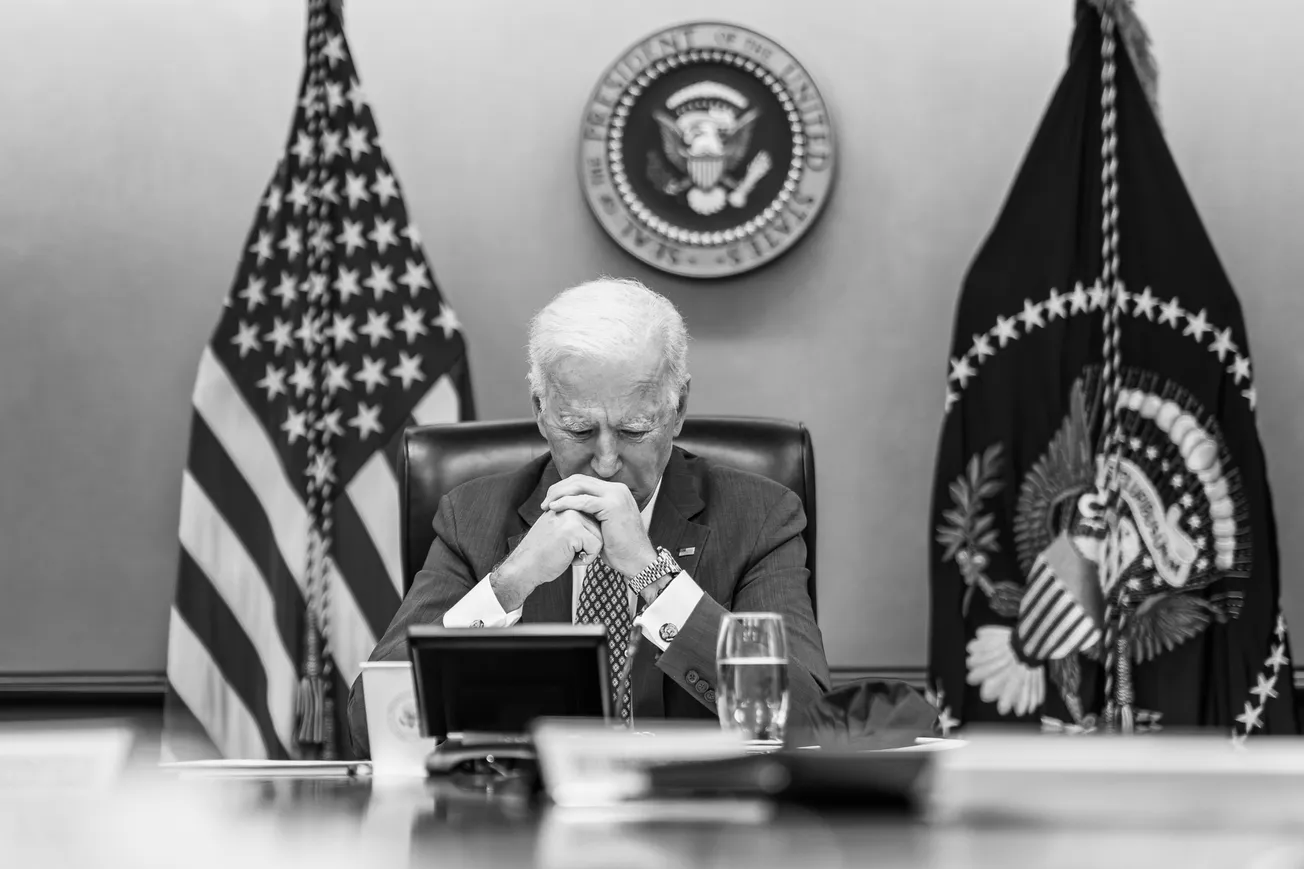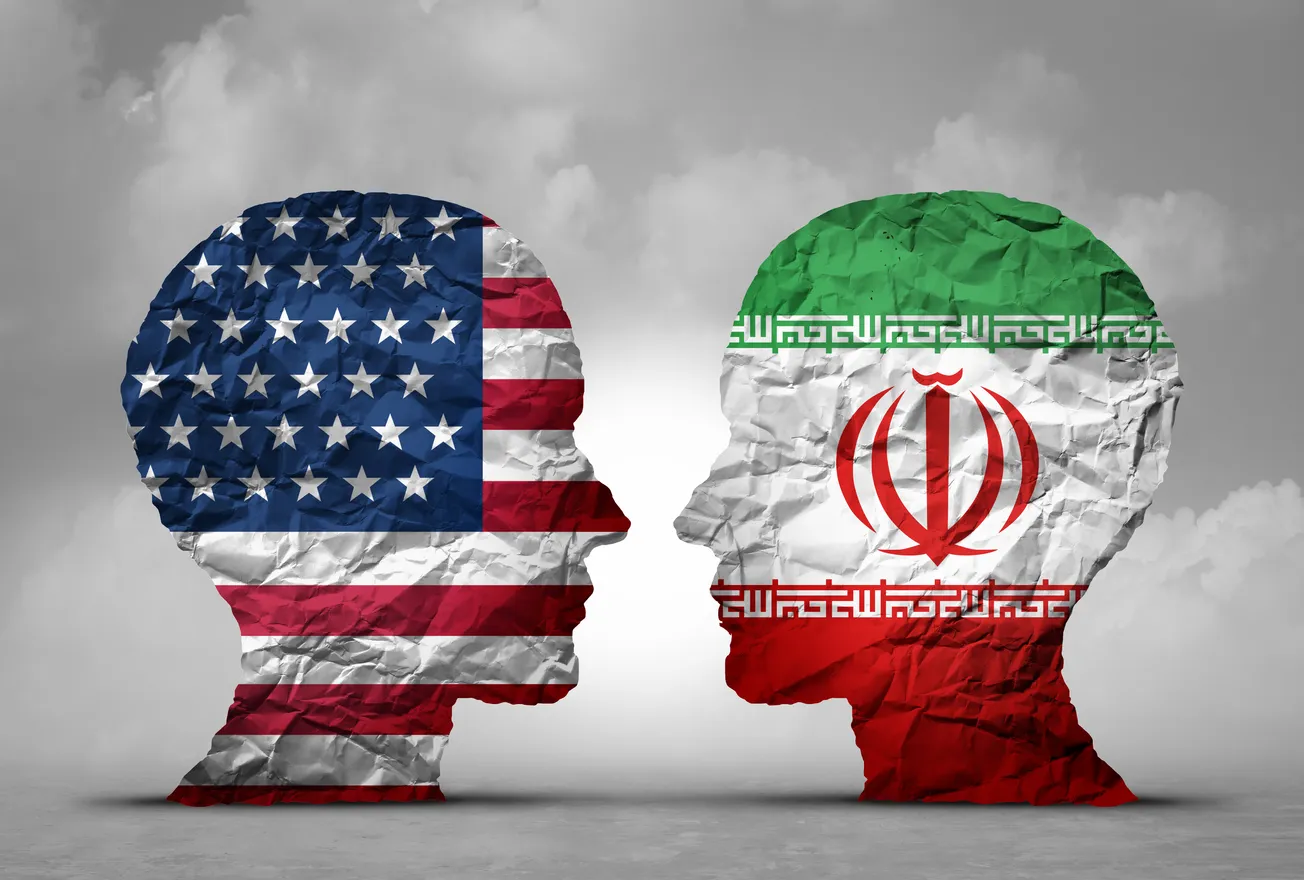The Biden administration threatened last month to withhold military aid from Israel if the IDF launched an operation in Rafah, the last Hamas stronghold in Gaza and the believed location of most of the remaining Israeli hostages. Superficially, the threat is a misguided concern for protecting civilians, though in reality, it is an equally misguided re-election strategy. Based on data from TIPP Insights, it appears the White House’s foray into abandoning one of America’s closest allies will accomplish neither.
Last month, Israel, which sees defeating Hamas in Rafah as absolutely necessary for its safety and possibly even survival, began preliminary operations in Rafah's outskirts. In response, the White House publicly carried out its threat to withhold weapons shipments but later quietly restored them.
The situation in Rafah is a unique result of the structure of the Gaza war: since October, Israel has defeated Hamas’s battalions in stages, starting from northern Gaza and moving south. In contrast to most armies worldwide, the IDF sacrificed the element of surprise in order to evacuate civilians out of combat zones at each stage, with many eventually ending up in Rafah, Gaza’s southernmost city. As a result, Rafah came to contain over a million people, fully half of Gaza’s population.
The White House claimed it was impossible to move such a large number of civilians out of harm's way, with Vice President Kamala Harris famously saying on ABC News, “I’ve studied the maps. There's nowhere for those folks to go.” Yet Israel did exactly that: moving some one million people out of Rafah and into “humanitarian islands” established by the IDF throughout Gaza, where locals have access to humanitarian aid and field hospitals, many of which offer superior medical care compared to Gaza’s conventional hospitals. The “impossible” evacuation took a mere ten days. In fairness to the White House, no military in history has moved so many civilians out of a war zone, so quickly and safely. These and other strategies have helped to produce the lowest civilian-to-combatant casualty ratio in human history, nine times lower than the UN global average and far lower than US numbers in places like Iraq and Afghanistan.
Late last month, a fire in a Rafah humanitarian zone produced heartbreaking images of death and destruction, triggering the “All eyes on Rafah'' social media campaign against Israel. However, as facts have come out, including intercepted cellphone conversations by Palestinians on the ground, it appears that the fire resulted not from Israeli strikes (which were over a mile away), but from a cache of flammable weapons Hamas had intentionally stored in the humanitarian zone. This misinformation is similar to the claim in October that Israel had bombed the Al Ahli hospital - it was later revealed that the Palestinian Islamic Jihad terror organization had carried out the bombing.
All of this begs the question: Why would the White House pursue a nonsensical and ultimately ineffective strategy of publicly breaking with its long-term ally?
Some far-left lawmakers are vocally hostile to Israel, including calls to end military support and echoing the “river to the sea” chant (widely understood as a call for Israel’s destruction). A recent survey by TIPP Insights showed that 59% of Democrats believe (erroneously) that Israel is committing genocide, a sentiment reflected in the violent anti-Israel and anti-America riots on college campuses.
Yet by catering to the far left, candidate Biden may cost himself the middle and perhaps lose more votes than he gains.
A recent TIPP poll reveals a strong association between opinions on this issue and voting behavior. 49% say this issue will have a “great deal” or “quite a bit” of influence on their vote, and 75% say that it will have at least some influence.
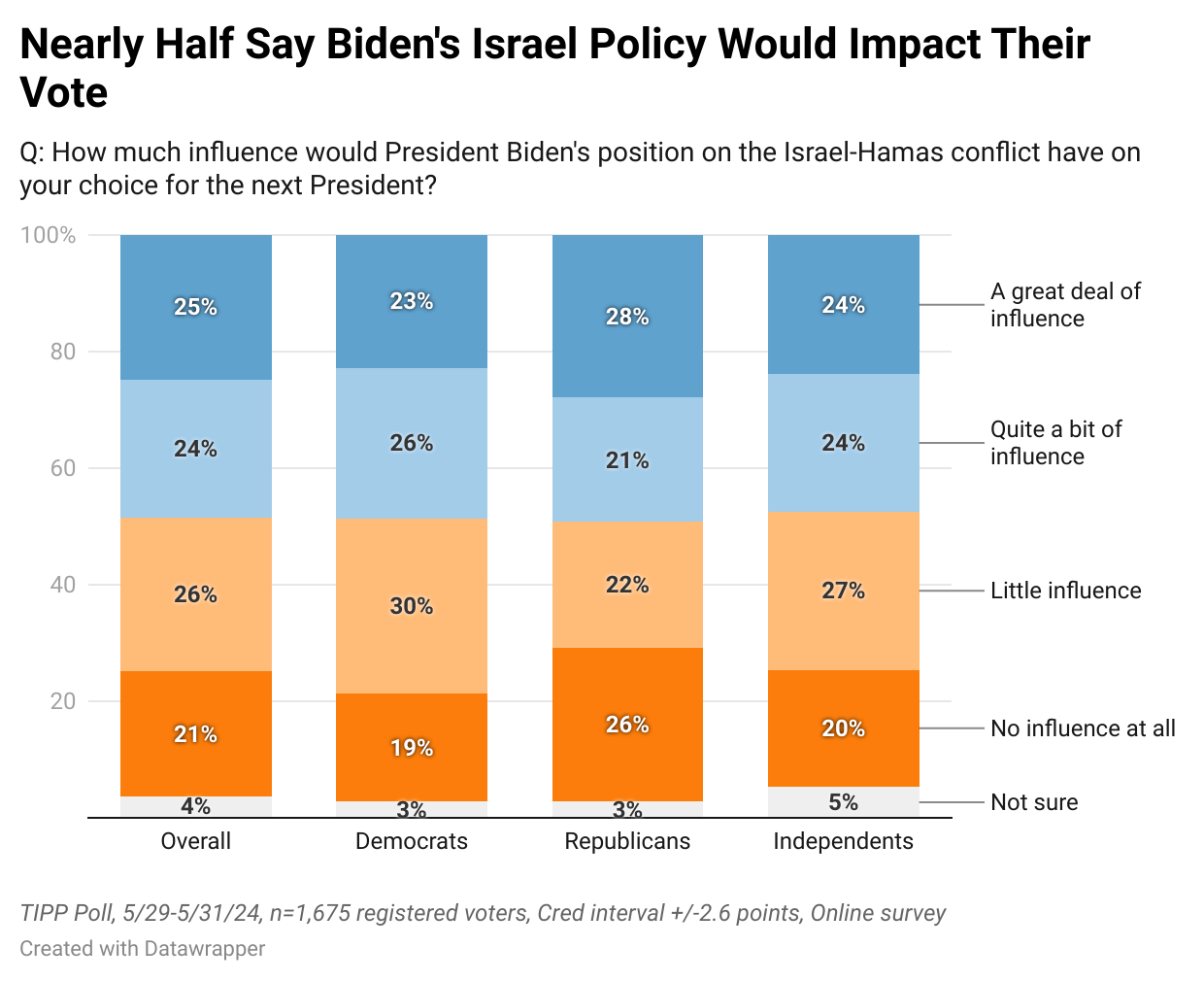
Support and opposition for Biden’s policy on this issue closely track party lines.
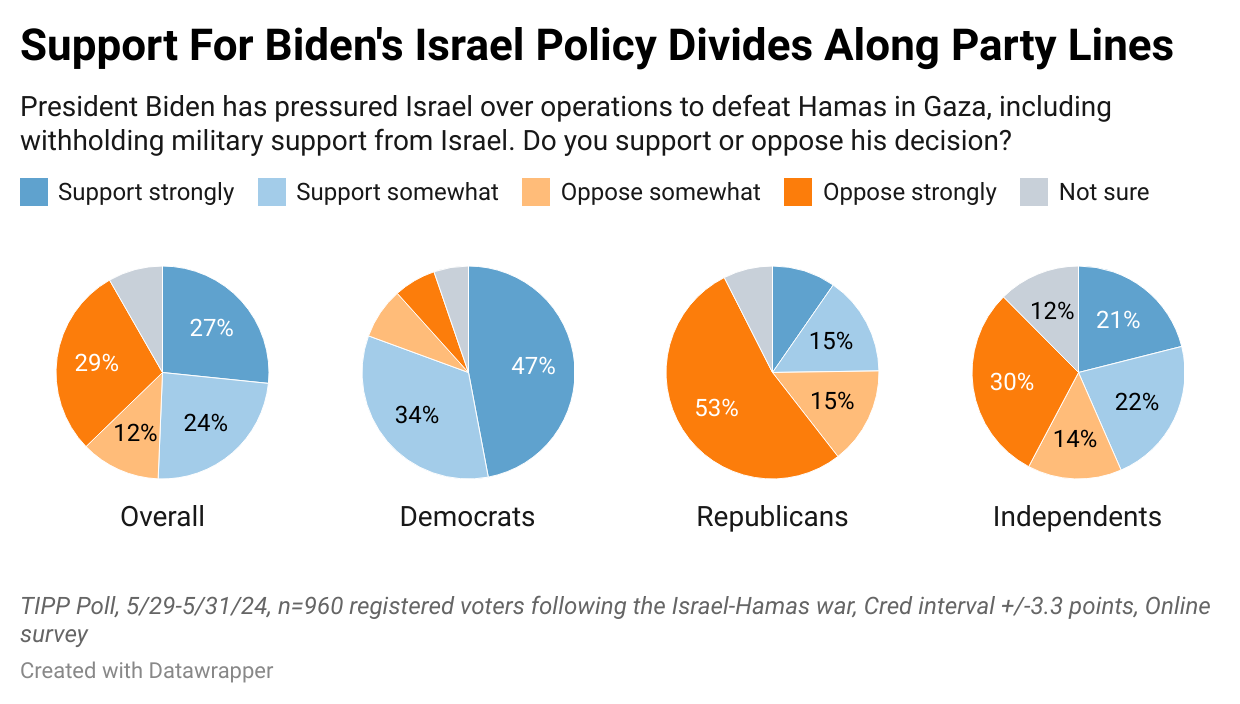
But within the all-important “independent” demographic, we analyzed those who have decided their vote and are following the Israel-Hamas war story. In this group of 208 independents in our survey sample, a solid majority—53 %—opposes the White House decision, while 47% support it. Further, of those who support Biden's policy, 83% plan to vote for him and 17% for Trump. In contrast, 92% of those who oppose Biden's policy plan to vote for Trump, with only 8% voting for Biden. This indicates a statistically significant association between Biden's policy and voting decisions among independents, with Trump benefitting more among independent voters.
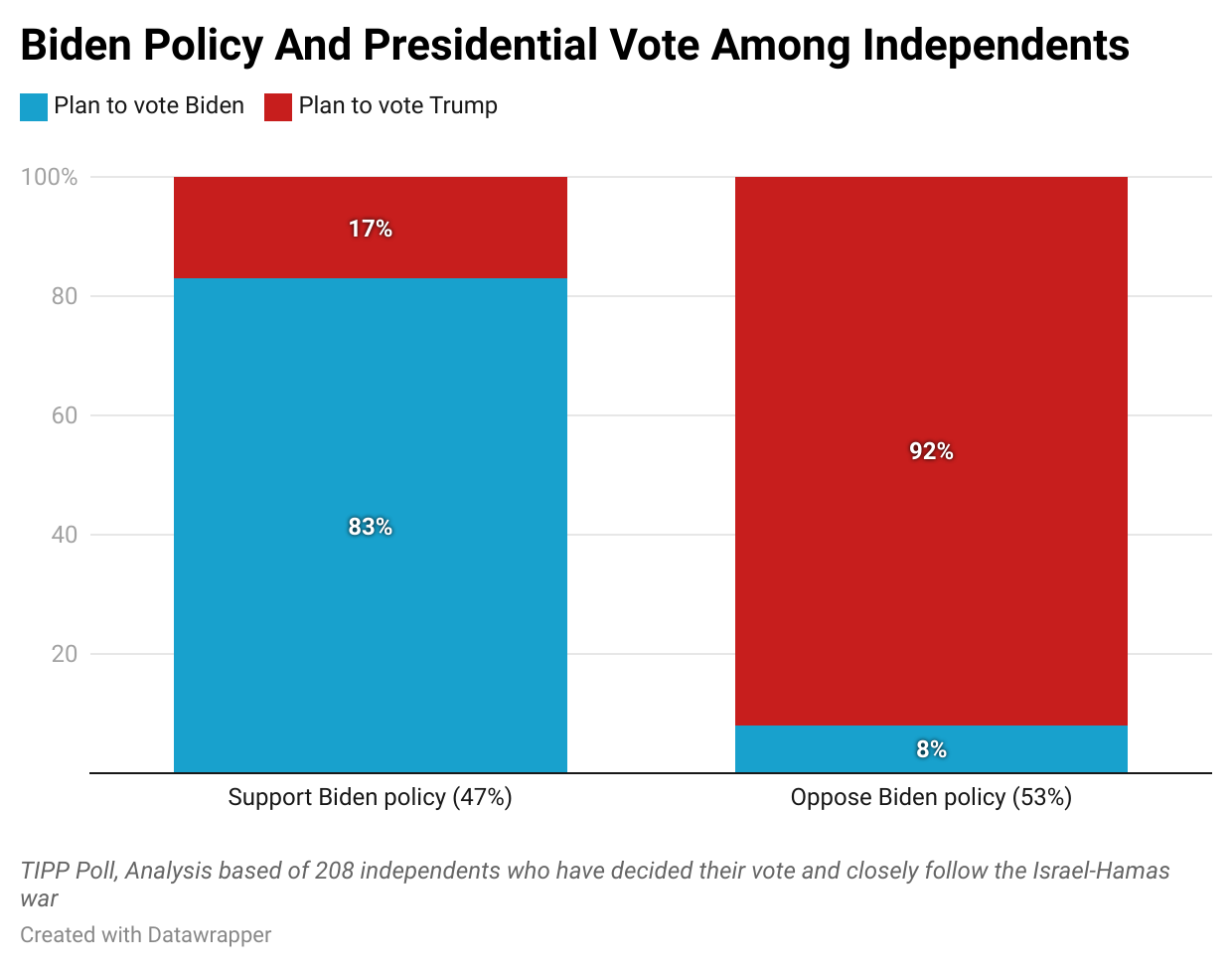
Candidates who “capture the middle” are historically more likely to win by large margins, such as Bill Clinton, Ronald Reagan, and John F. Kennedy. Indeed, 80% of Americans support Israel over Hamas, and mainstream lawmakers across the aisle vocally oppose Biden’s policy: Republican Senator Lindsey Graham called withholding weapons "obscene" given that Israel is "at a time of great peril," and Democratic Congressman Ritchie Torres said:
America cannot claim that its commitment to Israel is “iron-clad” and then proceed to withhold aid from Israel.
Dissent is rare in dictatorships (which includes effectively all of the Arab world) and, therefore, not always understood. America’s enemies see dissent between allies as a sign of weakness and an opportunity to attack, while America’s allies, who are watching events in Israel closely, worry whether they can trust America with their safety and survival. Democratic Congressman Torres articulated this concern when he said:
The mixed messaging makes a mockery of our credibility as an ally. No one will take our word seriously.
Even though the White House strategy is both disconnected from realities in Gaza, and not even likely to achieve the more cynical goal of winning votes, it is not without its dangers. By emboldening America’s enemies and frightening America’s allies, President Biden’s approach to Rafah threatens to destabilize the entire world order.
Daniel Pomerantz is an expert in international law, a lecturer at Reichman and Bar Ilan Universities in Israel, and the CEO of RealityCheck, a nonprofit NGO dedicated to clarifying global conversations with verifiable data. Daniel lives in Tel Aviv, Israel and can be found on Instagram at @danielspeaksup or at www.RealityCheckResearch.org.

